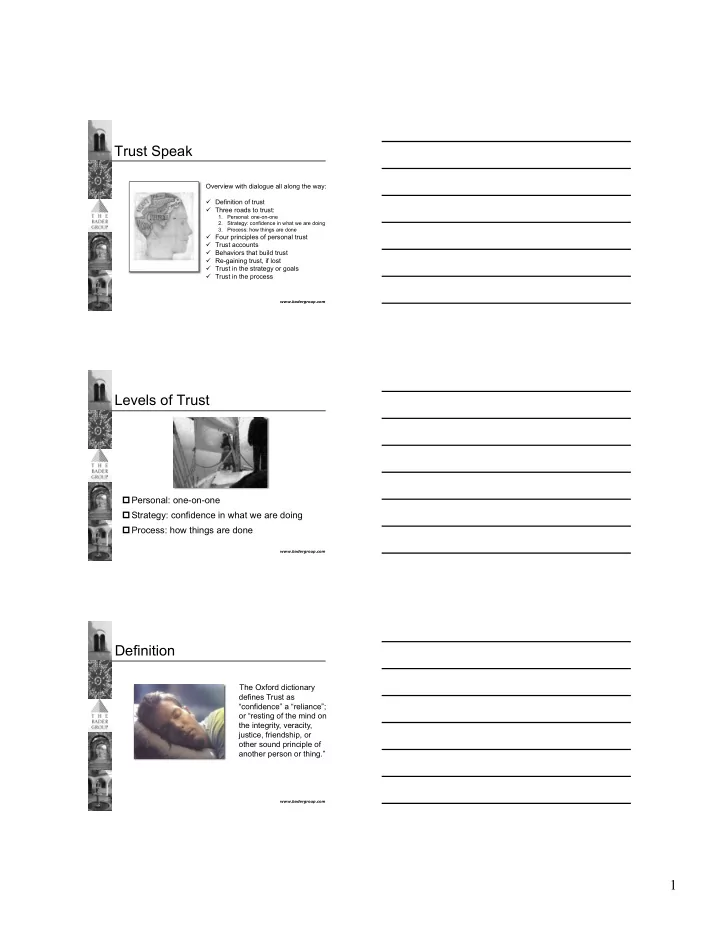

Trust Speak Overview with dialogue all along the way: � � Definition of trust � � Three roads to trust: 1. � Personal: one-on-one 2. � Strategy: confidence in what we are doing 3. � Process: how things are done � � Four principles of personal trust � � Trust accounts � � Behaviors that build trust � � Re-gaining trust, if lost � � Trust in the strategy or goals � � Trust in the process www.badergroup.com 0 Levels of Trust � � Personal: one-on-one � � Strategy: confidence in what we are doing � � Process: how things are done www.badergroup.com 1 Definition The Oxford dictionary defines Trust as “confidence” a “reliance”; or “resting of the mind on the integrity, veracity, justice, friendship, or other sound principle of another person or thing.” www.badergroup.com 2 1
Four principles of TRUST � � RESPECT centers on the belief that other people are honorable whatever their rank or role. It requires that we treat others fairly. Respect denotes reverence, deference, and courtesy towards others. � � OPENNESS is grounded in a willingness to freely share information, feelings, ideas and expectations with others. It suggests candor and frankness. � � RELIABILITY moves us to act. It is doing, with competence and skill, what you will say you will do. It is as simple as being on time and returning phone calls. � � HONESTY is truthfulness and integrity in words and actions and is the core of trust. Honesty is more than the absence of lying; it is the commitment to seek the truth. www.badergroup.com 3 Trust Account Work place actions and behaviors that are courteous, honest and commitment-fulfilling build the reserves in our "relationship accounts." Minor or major acts of discourtesy, disrespect, broken commitments and arbitrary or excessive negative reactions are comparable to withdrawals from accounts. Adapted from Stephen Covey’s Seven Habits of Highly Successful People www.badergroup.com 4 Behaviors to Build One’s Trust Account � � Disclose information fully � � Be willing to change � � Explain motives � � Keep confidences � � Surface and resolve conflicts � � Attend to details � � Do what you say you will do � � Say what needs to be said to the right person � � Keep promises � � Apologize; admit mistakes � � Try to understand what is � � Make expectations clear from important to others the start � � Communicate needed changes � � Acknowledge potential problems in a plan of action or mistakes � � Talk about others fairly � � Thank the messenger www.badergroup.com 5 2
Re-gaining trust, if lost via mediation � � I want to restore your trust in me. � � When did you lose trust in me? What was it that I did or did not do? What impact did it have on you and our relationship? LISTEN � � This is how I felt/understood this…(no blaming or accusing the other person) � � I want to mend this. I apologize for the misunderstanding. Here’s what I commit to doing…Will that restore your trust in me? LISTEN and thank www.badergroup.com 6 Symptoms of Lack of Trust in Strategy � � Confusion over priorities � � Poor decision making � � Ineffective and strained meetings � � Misunderstandings between individuals and functions � � Reduced quality � � Silence, sarcasm, gossip, blame � � Duplication of effort � � Difficulty in reaching the goal � � Poor accountability www.badergroup.com 7 How to Regain Trust in the Strategy � � Work at true consensus on the Strategy however long it takes; be sure each person’s opinion is truly heard � � Use a good change management system (e.g. Kotter’s) to implement the Strategy � � Accept questions and input about each other’s area of responsibility � � Encourage common understanding of roles and responsibilities � � Adjust the org. structure to support the strategy � � Make the hard decisions � � Ask for commitment � � Align the goals and partner www.badergroup.com 8 3
What builds Trust in a Process � � Transparency of purpose � � Input from users � � Adaptability/flexibility � � Efficiency/ease � � Respect of users’ time to fulfill � � True to org values, ethics � � Consistent application � � Supports the Strategy/ business/customer � � Clear and accurate data www.badergroup.com 9 4
Recommend
More recommend